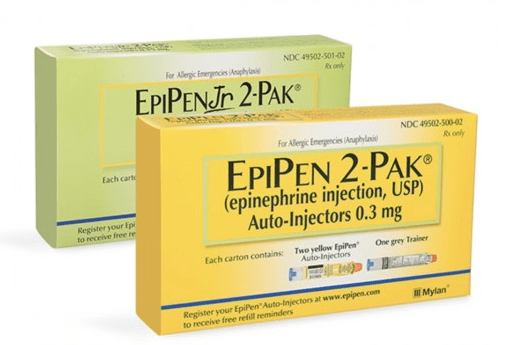EpiPen Disease Interactions
There are 5 disease interactions with EpiPen (epinephrine).
Sympathomimetics (applies to EpiPen) cardiovascular disease
Major Potential Hazard, High plausibility. Applicable conditions: Hyperthyroidism, Pheochromocytoma
Sympathomimetic agents may cause adverse cardiovascular effects, particularly when used in high dosages and/or in susceptible patients. In cardiac tissues, these agents may produce positive chronotropic and inotropic effects via stimulation of beta- 1 adrenergic receptors. Cardiac output, oxygen consumption, and the work of the heart may be increased. In the peripheral vasculature, vasoconstriction may occur via stimulation of alpha-1 adrenergic receptors. Palpitations, tachycardia, arrhythmia, hypertension, reflex bradycardia, coronary occlusion, cerebral vasculitis, myocardial infarction, cardiac arrest, and death have been reported. Some of these agents, particularly ephedra alkaloids (ephedrine, ma huang, phenylpropanolamine), may also predispose patients to hemorrhagic and ischemic stroke. Therapy with sympathomimetic agents should generally be avoided or administered cautiously in patients with sensitivity to sympathomimetic amines, hyperthyroidism, or underlying cardiovascular or cerebrovascular disorders. These agents should not be used in patients with severe coronary artery disease or severe/uncontrolled hypertension.
Sympathomimetics (applies to EpiPen) dehydration
Major Potential Hazard, High plausibility.
The use of sympathomimetic amines has been infrequently associated with significant hypotension especially in dehydrated patients secondary to the drug's beta-2 mediated vasodilation. Hypovolemia should be corrected, if possible, before administering sympathomimetic amines. Blood pressure and ECG should be monitored at regular intervals. Monitoring of cardiac output and pulmonary wedge pressure may also be desired.
Epinephrine (applies to EpiPen) parkinson's disease
Moderate Potential Hazard, Moderate plausibility. Applicable conditions: Parkinsonism, Neurologic Disorder
Epinephrine should be administered with caution to patients with Parkinson's disease as these patients may experience psychomotor agitation or notice a temporary worsening of symptoms.
Sympathomimetics (applies to EpiPen) acidosis
Moderate Potential Hazard, High plausibility.
Acidosis, hypoxia, and hypercapnia may reduce the effectiveness of sympathomimetic amines in raising blood pressure. These conditions should be corrected before initiating therapy with sympathomimetic amines, if possible. Monitoring the patients acid-base balance, carbon dioxide levels, and oxygen saturation is recommended.
Sympathomimetics (applies to EpiPen) diabetes
Moderate Potential Hazard, Moderate plausibility. Applicable conditions: Diabetes Mellitus
Sympathomimetic agents may cause increases in blood glucose concentrations. These effects are usually transient and slight but may be significant with dosages higher than those normally recommended. Therapy with sympathomimetic agents should be administered cautiously in patients with diabetes mellitus. Closer monitoring of blood glucose concentrations may be appropriate.
Switch to professional interaction data
EpiPen drug interactions
There are 230 drug interactions with EpiPen (epinephrine).
EpiPen alcohol/food interactions
There is 1 alcohol/food interaction with EpiPen (epinephrine).
More about EpiPen (epinephrine)
- EpiPen consumer information
- Check interactions
- Compare alternatives
- Pricing & coupons
- Reviews (11)
- Drug images
- Latest FDA alerts (5)
- Side effects
- Dosage information
- During pregnancy
- Generic availability
- Support group
- Drug class: adrenergic bronchodilators
- Breastfeeding
- En español
Related treatment guides
Drug Interaction Classification
| Highly clinically significant. Avoid combinations; the risk of the interaction outweighs the benefit. | |
| Moderately clinically significant. Usually avoid combinations; use it only under special circumstances. | |
| Minimally clinically significant. Minimize risk; assess risk and consider an alternative drug, take steps to circumvent the interaction risk and/or institute a monitoring plan. | |
| No interaction information available. |
See also:
Further information
Always consult your healthcare provider to ensure the information displayed on this page applies to your personal circumstances.


